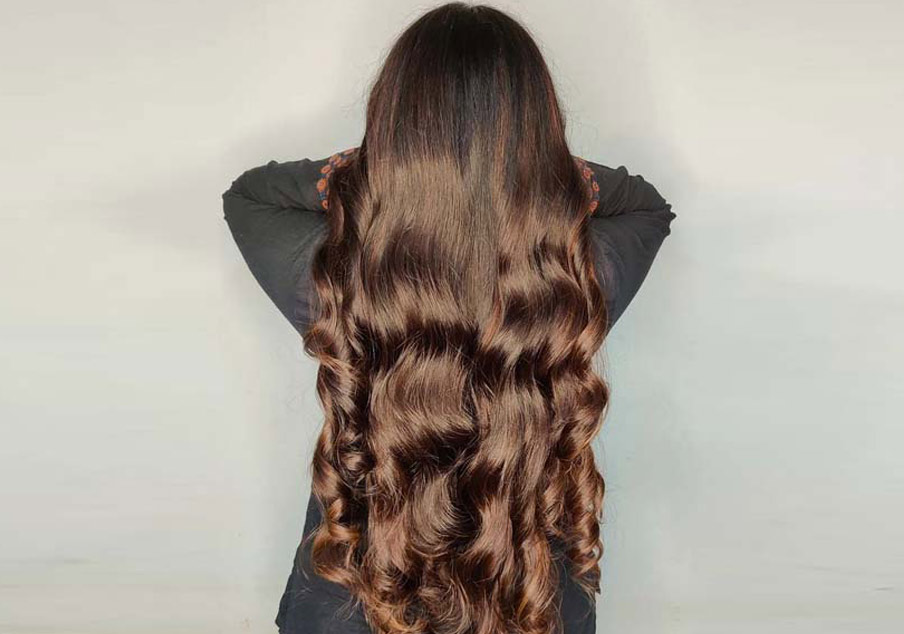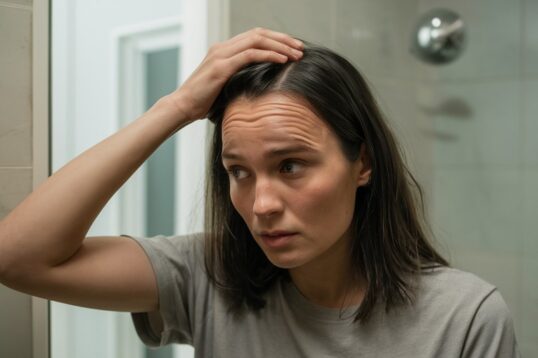The treatment and growth of hair are crucial in the overall well-being and self-esteem of individuals. A head of hair that is shiny, thick, full, and free from dirt or dandruff can improve our self-esteem and quality of life.
Unfortunately, balding and hair shedding can also be a reality for many people, which can be uncomfortable and even affect their everyday functioning.
While some causes of hair loss are beyond our control, such as heredity, hormones, and environmental factors, it’s important to note that effective and healthy hair development is within our control. It requires a consistent supply of nutrition and nourishment to the body to promote hair growth, empowering us to take charge of our hair health.
Hair condition reflects beauty and is associated with hygiene and health status. Most individuals experience hair loss issues, including thinning, breakage, and hair loss, due to inherited traits, hormonal fluctuations, diet, and stress levels. Recently, there has been a mass appreciation for vitamins, especially hair regrowth.
Vitamins are said to help regrowth, reduce shedding, and improve the texture of hair. Do they, however, function? We will go over the function of vitamins, the proof of their effectiveness, and advice for those who want to grow healthier hair in Vitamins for Hair Growth you can Add Nutrients for Healthy Hair.
These elements are sustenances that are necessary for hair growth.
Understanding Hair Growth

The growth cycle, dietary habits, stress levels, hormonal variations, genetic predispositions, and other factors influence hair development.
Hair Growth Cycle
1. Anagen Phase:
- During the stage of dynamic growth, hair follicles produce new hair.
- The length of the anagen period varies with genetics, but it usually lasts two to seven years.
- The duration of this phase defines the maximum length of the hair.
2. Catagen Phase:
- Also referred to as the transitional phase, this brief stage is when hair growth ceases.
- During this stage, hair follicles contract and separate from the blood supply.
- About two to three weeks pass during the catagen phase.
3. Telogen Phase:
- The resting phase is when the old hair sheds and is released.
- The ageing hair follicle gives way to new hair growth.
- About three to four months pass during the telogen period.
Factors Affecting Hair Growth
- Genetics:
- Hormonal Imbalances:
- Diet:
- Stress:
The Critical Role of Nutrition
- Sustaining healthy hair development and averting hair loss require proper nutrition.
- Vitamins, minerals, and protein provide the building blocks for hair follicle function and growth.
- For optimal hair health, a diet of fruits, vegetables, lean proteins, whole grains, and healthy fats is advised.
- Certain nutrients, such as iron, vitamin D, biotin, and omega-3 fatty acids, have been attached to better hair quality and growth.
- Understanding the hair growth cycle and its various factors is essential for addressing growth concerns and maintaining healthy hair.
Understanding Vitamins for Hair Growth
What Are Vitamins for Hair Growth?
- Vitamins for hair growth are oral dietary supplements designed to support hair health, enhance development, and reduce hair loss.
- They come in various forms, including capsules, tablets, gummies, and powders.
- These supplements often contain vitamins, minerals, amino acids, and plant extracts.
Essential these supplements are combined with vitamins for hair growth :
| Vitamins for hair growth | Essential |
|---|---|
| Biotin (Vitamin B7) | Biotin is required to produce keratin, the protein that comprises hair strands, so biotin-containing hair is the healthiest form. |
| Vitamin D | Enough vitamin D is needed to maintain healthy hair follicles. It could help stop. |
| Vitamin E | Antioxidant vitamin E increases blood flow to the scalp, stimulating hair development. |
| Iron | An iron deficiency may cause hair thinning. Usually, iron is contained in accessories that promote hair growth. |
| Zinc | Zinc contributes to hair tissue growth and repair. |
| Collagen | Collagen peptides may improve hair thickness and prevent hair loss. |
| Amino Acids | L-cystine, L-lysine, and L-methionine are amino acids that play a role in hair structure and growth. |
| Herbs and Botanicals | Saw palmetto, ashwagandha, and curcumin are some examples. These botanicals are believed to have hair-related benefits. |
Marketing Claims and Controversies:
- Hair-growth supplements are often marketed as a solution for various hair-related issues, including thinning hair, hair loss, and lack of shine.
- However, the efficacy of these supplements remains a topic of debate. Scientific evidence is mixed, and individual responses vary.
- Some studies suggest positive effects, while others find no significant improvement.
- It’s essential to approach these supplements with realistic expectations and consult a healthcare professional.
Cautionary Notes:
- Nutrient deficits are not the source of every hair problem. Hormonal imbalances, stress, and genetics are a few more variables that come into play.
- Combining supplements with a balanced diet, hydration, and stress management is crucial for overall hair health.
- Before you begin a new supplement regimen, you can always get advice from your healthcare physician.
Recall that although vitamins for hair growth could help some people, they are not a miracle cure. A holistic strategy that considers lifestyle and general health is necessary to maintain attractive, resilient hair.
Types of Supplements and Vitamins for Hair Growth

Explore the various kinds of supplements and vitamins for hair growth supplements and how each type assists in maintaining healthy locks.
- Vitamins and Minerals:
- Vitamin A: Essential for cell growth, including hair follicles. It helps produce sebum, which moisturises the scalp.
- Vitamin B Complex (Biotin, B6, B12): Biotin (Vitamin B7) is particularly popular for hair health. It supports keratin production and strengthens hair.
- Vitamin C: An antioxidant that aids collagen production, crucial for hair structure.
- Vitamin D: Supports hair follicle cycling and may prevent hair loss.
- Vitamin E: Improves blood circulation on the scalp.
- Iron: A low iron level may cause hair thinning. You must absorb foods high in iron or take supplements.
- Selenium: An antioxidant that promotes hair health.
- Zinc: Supports hair growth and repair.
- Proteins and Amino Acids:
- Collagen Peptides: The protein known as collagen is what gives hair its strands. Peptides may stop hair loss and increase thickness.
- L-cystine, L-lysine, and L-methionine: These amino acids contribute to hair structure and growth.
- Herbs and Botanicals:
- Saw Palmetto: It may block the enzyme that causes hair loss (DHT) obtained from the fruit of the saw palmetto plant.
- Curcumin (Turmeric): Curcumin is anti-inflammatory and may benefit the scalp’s health.
- Capsaicin (Chili Peppers): Some studies suggest capsaicin stimulates hair growth by improving blood outpour to the scalp.
- Ashwagandha: An adaptogenic herb that helps control stress. Chronic stress can affect hair health indirectly.
- Omega-3: To keep the scalp and hair follicles healthy, omega-3 fatty acids are necessary. Their anti-inflammatory qualities can lessen damage and encourage the growth of new hair. Overall, it’s believed that omega-3s improve the health of the hair and scalp.
To remind you, individual responses to these supplements vary. While some people experience positive effects, others may not notice significant changes. Always consult a healthcare specialist before starting any new supplement regimen.
How to Use Vitamins for Hair Growth
- Incorporate Vitamins into a Balanced Diet
A well-rounded, nutrient-dense diet is the best way to get the vitamins and nutrients needed for healthy hair growth. Focus on including foods rich in the essential vitamins for hair growth, such as:
- Consider Supplements if Deficient
- Choose High-Quality Supplements
- Be Patient and Consistent
- Combine with Other Hair Care Practices
Scientific Evidence and Research
- Scientific Studies Overview:
- Findings and Conclusions:
- Discrepancies and Limitations:
Highlighting these main points provides a comprehensive overview of the scientific evidence on vitamins for hair growth, along with their limitations and discrepancies.
Best Practices Vitamins for Hair Growth Health
Explore the best practices for maintaining healthy hair beyond just relying on Vitamins for hair growth:
- Vitamins Alone Aren’t a Magic Solution:
- Balanced Diet for Beautiful Locks:
Nutrient-rich foods: Include a variety of foods rich in vitamins, minerals, and proteins.
- Stress Management Matters:
- Chronic stress can lead to hair loss. Practice stress-reducing techniques:
- Consulting a Professional:
Remember, beautiful hair reflects overall well-being. Nourish your body, manage stress, and seek professional guidance when needed.
Natural Vitamins vs. Supplement Sources
| Aspect | Vitamins come from natural food sources. | Supplements |
|---|---|---|
| Nutrient Absorption | The body often absorbs nutrients from natural foods more quickly due to their natural form and complementary nutrients. | Supplements offer concentrated doses of specific vitamins, ensuring targeted intake, but absorption may vary depending on factors like formulation and individual health status. |
| Overall Nutrition | Natural foods provide a wide range of essential nutrients beyond vitamins, including fibre, minerals, and phytonutrients, supporting overall health and well-being. | Supplements focus solely on delivering specific vitamins, potentially lacking the synergistic benefits of a diverse diet. |
| Bioavailability | The bioavailability of nutrients in natural foods is optimized by the presence of co-factors and enzymes, enhancing absorption and utilization by the body. | Supplement bioavailability may vary, with some formulations containing synthetic or less bioavailable forms of vitamins impacting effectiveness. |
| Cost Considerations | While natural foods may be more expensive in some cases, they offer many health benefits beyond just providing vitamins, making them a cost-effective option in the long run. | Supplements can be cost-effective for targeted nutrient intake, but the expense may increase, especially for high-quality formulations. |
Expert Opinions and Testimonials
Expert Opinions:
- Dermatologists and Trichologists: These professionals, who specialize in skin, hair, and scalp health, provide valuable insights into the role of vitamins for hair growth.
- Dermatologists and trichologists commonly emphasise the significance of a balanced diet rich in minerals and vitamins for hair growth to promote healthy hair growth.
- Consultation: They advise individuals to consult with healthcare professionals before starting any supplementation regimen to address underlying health issues and ensure safety and efficacy.
Real-life Testimonials:
- Personal Experiences: Testimonials from individuals who have tried vitamins for hair growth offer firsthand accounts of their effectiveness.
- Benefits: Testimonials may highlight improvements in hair quality, thickness, and overall growth observed by individuals.
- Varied Responses: It’s important to acknowledge that responses to vitamin supplements can vary among individuals, and testimonials should be considered alongside expert advice and scientific evidence.
Balancing Expert Advice and Anecdotal Evidence:
- Evidence-based Recommendations: Expert advice from dermatologists and trichologists forms the basis of recommendations for hair health, relying on scientific research and clinical experience.
- Consideration of Anecdotal Evidence: While real-life testimonials can provide insights, they should be viewed cautiously and considered alongside expert guidance and scientific evidence.
- Informed Decision-making: By integrating expert advice with anecdotal proof, individuals can make informed judgments about incorporating vitamins and supplements into their hair care routine, ensuring comprehensive and personalized care.
Conclusion
Maintaining healthy hair growth involves a multifaceted approach encompassing nutrition, hair care practices, stress management, and lifestyle habits. While vitamins are crucial in supporting hair health, they are just one piece of the puzzle. A well-balanced diet rich in essential elements, such as minerals and vitamins for hair growth, is the foundation for robust and resilient hair.
Proper hair care routines, such as gentle washing and avoiding excessive heat styling, help protect the hair from damage and breakage. Additionally, managing stress through relaxation techniques and incorporating regular activity and adequate sleep into your lifestyle can further support overall hair health.
Achieving and maintaining healthy hair growth requires a comprehensive approach that considers internal and external variables. You may nurture your hair from the inside out by taking vitamins for hair growth, practising healthy hair care, handling stress properly, and living a balanced lifestyle.
FAQs for Vitamins for Hair Growth
What vitamins are essential for promoting hair growth?
Scalp healthVitamins A and B complex (which includes biotin, niacin, and pantothenic acid), C, D, and E are essential for hair growth. These vitamins encourage robust, healthy hair growth, nourish hair follicles, and support the health of the scalp.
Can vitamin supplements alone stimulate hair growth?
Although vitamin supplements can help maintain hair condition overall, they work best when paired with a flat diet and healthy lifestyle choices. While vitamin deficiencies can be a factor in hair loss, other factors, such as hormone imbalances, heredity, or underlying medical issues, may prevent supplements from stimulating hair growth.
Do vitamins for hair growth have any adverse effects?
Vitamins are safe to consume as long as they are taken as prescribed. But taking too much of some vitamins, including vitamin A, can have adverse effects, such hair loss. Before beginning any new supplement regimen, it is imperative to adhere to stated dosage requirements and see a healthcare provider, particularly if you are taking medication or have pre-existing health concerns.
How long does it take to see results from taking vitamins for hair growth?
Depending on several variables, including the individual’s response, the extent of hair loss or damage, and the particular vitamins being supplemented, the timeframe for observing benefits from taking vitamin supplements for hair growth may differ. Typically, it can take a few weeks to months to see observable benefits in the condition and development of your hair. A balanced diet and way of living, along with supplementing consistency, are essential for attaining and sustaining ideal outcomes.
Can vitamins prevent hair loss?
While taking vitamin supplements alone may not prevent hair loss if other underlying reasons are present, vitamin deficiencies can lead to hair loss, particularly in cases of severe insufficiency. To support general hair health and reduce the chance of hair loss, it’s critical to treat any underlying medical disorders, maintain a balanced diet rich in key nutrients, and adopt good hair care practices.
Are there any specific vitamins that are more effective for hair growth than others?
Although different vitamins are necessary to maintain the health of hair, no vitamin is intrinsically better than any other for promoting hair growth. In a different way, every vitamin boosts hair growth, nourishes hair follicles, and improves scalp health. For the best possible health and growth of hair, a nutritious diet, regular exercise, and a balanced intake of necessary vitamins are required.

